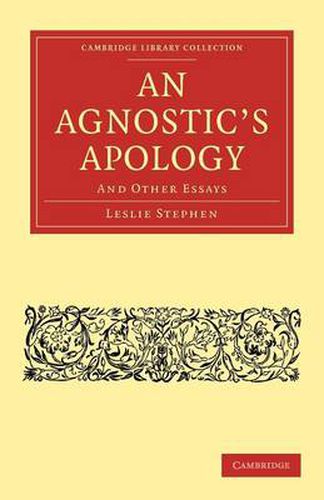Readings Newsletter
Become a Readings Member to make your shopping experience even easier.
Sign in or sign up for free!
You’re not far away from qualifying for FREE standard shipping within Australia
You’ve qualified for FREE standard shipping within Australia
The cart is loading…






The term ‘agnostic’ was probably coined by T. H. Huxley during a speech to the Metaphysical Society in 1869. From the Greek ‘agnostos’, ‘unknown’, it was derived from St Paul’s mention of an Athenian altar inscribed ‘to the unknown god’. With these overtones of ancient philosophy, agnosticism became the tag of an emergent school of thought which posited that the existence of anything beyond the material and measurable should be considered unknowable. In this collection of seven essays, first published as one volume in 1893, Leslie Stephen (1832-1904) makes a study of the ‘unknown’. Across the essays, he presents arguments for the intrinsic agnosticism of many of the basic tenets of deism, explores the way in which humans construct dreams and realities, and examines the relationship between physics and philosophy. This readable and entertaining book will be of interest to students of both theology and philosophy.
$9.00 standard shipping within Australia
FREE standard shipping within Australia for orders over $100.00
Express & International shipping calculated at checkout
The term ‘agnostic’ was probably coined by T. H. Huxley during a speech to the Metaphysical Society in 1869. From the Greek ‘agnostos’, ‘unknown’, it was derived from St Paul’s mention of an Athenian altar inscribed ‘to the unknown god’. With these overtones of ancient philosophy, agnosticism became the tag of an emergent school of thought which posited that the existence of anything beyond the material and measurable should be considered unknowable. In this collection of seven essays, first published as one volume in 1893, Leslie Stephen (1832-1904) makes a study of the ‘unknown’. Across the essays, he presents arguments for the intrinsic agnosticism of many of the basic tenets of deism, explores the way in which humans construct dreams and realities, and examines the relationship between physics and philosophy. This readable and entertaining book will be of interest to students of both theology and philosophy.